20 aug 2014

One of the few existing photographs of Muhammad Deif, taken at least 20 years ago
Hamas said on Wednesday its military commander Muhammad Deif was alive and still calling the shots in the ongoing war with Israel in and around Gaza.
"The head of the Ezzedine al-Qassam Brigades Abu Khaled is still alive and leading the military operation," a source close to the Islamist movement told AFP, using Deif's nom-de-guerre.
His remarks were made after an Israeli air strike leveled a six-story house in Gaza City, killing Deif's wife and infant son.
It was not immediately clear whether Deif had also been killed or injured in the strike, which also killed another woman and a teenager.
Israeli military sources had earlier told Fox News that the leader had been killed in the strike as well, in what would have potentially been a major blow for the group.
Muhammad Deif has been an active leader in Hamas' military wing for decades, and has long been an extremely mysterious figure in the Palestinian resistance movement.
He is said to live completely underground from where he directs Hamas military actions, and a photograph has not been taken of him in decades.
Hamas spokesman Sami Abu Zuhri also issued a statement, saying Israelis would not be safe until Deif decided so.
"The occupation will pay for its crimes against Palestinian civilians and those living around the Gaza border will not return home until Muhammad Deif decides so," he said.
Earlier, Israel's Foreign Minister Avigdor Lieberman called for military action to topple Hamas, saying the movement was clearly dictating the pace of the confrontation.
"This policy of 'quiet for quiet' effectively means that Hamas is the initiator and the one deciding when, where and how to shoot at Israeli citizens," he wrote on his Facebook page.
"Hamas is controlling the height of the flames and chooses when to disturb the rhythm of life for people in Israel," he said, indicating the rocket fire from Gaza was unlikely to stop.
"When we speak seriously about Israelis' security we must understand that there is no other option other than decisive action with one meaning - toppling Hamas."
Lieberman is one of the most hardline members of Israel's inner security cabinet, which was meeting on Wednesday afternoon to discuss the situation, media reports said.
Hamas said on Wednesday its military commander Muhammad Deif was alive and still calling the shots in the ongoing war with Israel in and around Gaza.
"The head of the Ezzedine al-Qassam Brigades Abu Khaled is still alive and leading the military operation," a source close to the Islamist movement told AFP, using Deif's nom-de-guerre.
His remarks were made after an Israeli air strike leveled a six-story house in Gaza City, killing Deif's wife and infant son.
It was not immediately clear whether Deif had also been killed or injured in the strike, which also killed another woman and a teenager.
Israeli military sources had earlier told Fox News that the leader had been killed in the strike as well, in what would have potentially been a major blow for the group.
Muhammad Deif has been an active leader in Hamas' military wing for decades, and has long been an extremely mysterious figure in the Palestinian resistance movement.
He is said to live completely underground from where he directs Hamas military actions, and a photograph has not been taken of him in decades.
Hamas spokesman Sami Abu Zuhri also issued a statement, saying Israelis would not be safe until Deif decided so.
"The occupation will pay for its crimes against Palestinian civilians and those living around the Gaza border will not return home until Muhammad Deif decides so," he said.
Earlier, Israel's Foreign Minister Avigdor Lieberman called for military action to topple Hamas, saying the movement was clearly dictating the pace of the confrontation.
"This policy of 'quiet for quiet' effectively means that Hamas is the initiator and the one deciding when, where and how to shoot at Israeli citizens," he wrote on his Facebook page.
"Hamas is controlling the height of the flames and chooses when to disturb the rhythm of life for people in Israel," he said, indicating the rocket fire from Gaza was unlikely to stop.
"When we speak seriously about Israelis' security we must understand that there is no other option other than decisive action with one meaning - toppling Hamas."
Lieberman is one of the most hardline members of Israel's inner security cabinet, which was meeting on Wednesday afternoon to discuss the situation, media reports said.
|
|
Israeli municipality authorities in East Jerusalem recently changed the name of a street named after a companion of the Prophet Muhammad because it is shared with a Hamas spokesman, locals told Ma'an Tuesday.
Palestinian residents in the neighborhood of Sheikh Jarrah north of the Old City said that municipality staff had torn down signs on "Abu Ubaida" street and replaced them with "Bahaa al-Din." Abu Ubaida is the name of a spokesman for Hamas' military wing that has enjoyed a surge in popularity among Palestinians in recent weeks, amid an Israeli assault on Gaza that has killed more than 2,000. |
Locals told Ma'an that they believed the change was likely due to Israeli awareness of the spokesman's rising popularity as his statements have been translated for Hebrew-speaking audiences.
Locals also stressed that the street had been named Abu Ubeida for years and the name referred to Abu Ubaida Ibn al-Jarrah, who was one of the companions of the Prophet Muhammad, and not to the spokesman.
Although a Palestinian neighborhood of East Jerusalem -- which has been militarily occupied by Israel since 1967 -- Sheikh Jarrah has in recent years come under sustained attack by Jewish settlers, who have evicted locals from their homes in a bid to build Israeli settlements.
Locals also stressed that the street had been named Abu Ubeida for years and the name referred to Abu Ubaida Ibn al-Jarrah, who was one of the companions of the Prophet Muhammad, and not to the spokesman.
Although a Palestinian neighborhood of East Jerusalem -- which has been militarily occupied by Israel since 1967 -- Sheikh Jarrah has in recent years come under sustained attack by Jewish settlers, who have evicted locals from their homes in a bid to build Israeli settlements.
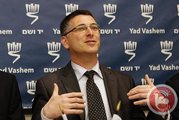
An Israeli cabinet minister on Wednesday justified an airstrike on Gaza that killed the wife and child of Hamas military leader Mohammed Deif, saying he was a legitimate target.
"Mohammed Deif deserves to die just like (the late al-Qaeda leader Osama) bin Laden. He is an arch murderer and as long as we have an opportunity we will try to kill him," Interior Minister Gideon Saar told army radio.
It was not immediately clear whether Deif had been killed or injured in the strike, which leveled a six-story house in Gaza City's Sheikh Radwan neighborhood late on Tuesday.
Emergency services spokesman Ashraf al-Qidra initially said three people were killed in the strike, among them an unidentified man, but later revised the toll down to two. He did not explain why.
Among the dead were Deif's second wife, Widad, 27, and his seven-month-old son Ali. Rescue workers on Wednesday pulled the bodies of a 48-year-old woman and a 14-year-old boy from the rubble, Qudra said.
Witnesses said at least three rockets were fired at the building, home to the al-Dalou family, pulverizing it into a pile of dust, debris and twisted metal and leaving a huge crater in the ground where the building once stood.
Appointed head of Hamas' armed wing in 2002 after his predecessor Salah Shehade was assassinated when Israel dropped a one-ton bomb on his house, Deif has already escaped five previous assassination attempts by Israel.
The Israelis see him as "the brains" behind the campaign of suicide bombings that targeted buses and public places during the Second Intifada (2000-2005) and consider him personally responsible for the deaths of dozens of civilians.
"Mohammed Deif deserves to die just like (the late al-Qaeda leader Osama) bin Laden. He is an arch murderer and as long as we have an opportunity we will try to kill him," Interior Minister Gideon Saar told army radio.
It was not immediately clear whether Deif had been killed or injured in the strike, which leveled a six-story house in Gaza City's Sheikh Radwan neighborhood late on Tuesday.
Emergency services spokesman Ashraf al-Qidra initially said three people were killed in the strike, among them an unidentified man, but later revised the toll down to two. He did not explain why.
Among the dead were Deif's second wife, Widad, 27, and his seven-month-old son Ali. Rescue workers on Wednesday pulled the bodies of a 48-year-old woman and a 14-year-old boy from the rubble, Qudra said.
Witnesses said at least three rockets were fired at the building, home to the al-Dalou family, pulverizing it into a pile of dust, debris and twisted metal and leaving a huge crater in the ground where the building once stood.
Appointed head of Hamas' armed wing in 2002 after his predecessor Salah Shehade was assassinated when Israel dropped a one-ton bomb on his house, Deif has already escaped five previous assassination attempts by Israel.
The Israelis see him as "the brains" behind the campaign of suicide bombings that targeted buses and public places during the Second Intifada (2000-2005) and consider him personally responsible for the deaths of dozens of civilians.
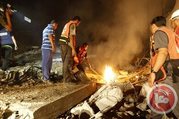
Palestinian rescuers clear the rubble of a destroyed house following an Israeli air strike in Gaza City on Aug. 19, 2014
Renewed Israeli attacks on Gaza have killed 22 Palestinians since a temporary ceasefire collapsed on Tuesday, a health ministry spokesman said Wednesday.
The deaths brought the total Palestinian death toll in six weeks of Israeli bombardment to more than 2,040, with more than 10,200 injured as well.
Ashraf al-Qidra said on Tuesday afternoon that two Palestinians were killed in an Israeli airstrike on Deir al-Balah in the central Gaza Strip on Wednesday. The dead were identified as Muhammad Imad al-Abit, 16, and Saher al-Abit, 11.
Six Palestinians were also injured in a strike on al-Mughraqa on the central Gaza Strip. The injured were taken to al-Aqsa Martyrs' Hospital.
Two were injured in an airstrike on the al-Abdaleh family home in Khan Younis.
Zaki Suleiman al-Rai, 54, died from wounds sustained earlier Wednesday.
The bodies of Mustafa Rabah al-Dalou, 14 and Wafaa Hussein al-Dalou were also recovered from the wreckage of the al-Dalou family home in Gaza City.
Earlier, a two-year-old Palestinian girl was killed in Israeli shelling on the al-Zaytoun neighborhood of Gaza City, al-Qidra said.
She was identified as Nour Muhammad Abu Hasirah.
Before that, al-Qidra said an Israeli airstrike killed an unidentified man near the al-Maqusi residential buildings in western Gaza City. The man's body was taken to Shifa hospital.
Al-Qidra added that civil defense rescue teams had recovered the bodies of a woman and a child from the rubble of the al-Dalou family home in Sheikh Radwan, which was hit by five Israeli missiles.
The wife and daughter of al-Qassam Brigades commander Muhammad Deif were killed in the attack, Hamas says, along with four-year-old Ahmad al-Dalou.
A 24-hour truce due to last until midnight collapsed late Tuesday afternoon when Israel said rockets fired from the Strip hit Beersheba. Hamas denied firing the rockets.
An Israeli army statement said that 137 rockets had been fired at Israel from Gaza since the truce collapsed.
One of them hit a home in Ashkelon without causing injuries, it said.
Earlier, the army said it had struck "some 60 terror sites" in Gaza overnight, in addition to targeting "two terrorists ... in the northern Gaza Strip."
Over 2,000 Palestinians -- the vast majority of them civilians -- have been killed throughout Israel's offensive on Gaza.
Sixty-seven people have been killed on the Israeli side, 64 of them soldiers.
2 dead in Deir al-Balah airstrike, 8 injured in strikes across Gaza
Two Palestinians were killed in an Israeli airstrike on Deir al-Balah in the central Gaza Strip on Wednesday.
Gaza medical authorities identified the dead as Muhammad Imad al-Abit, 16, and Saher al-Abit, 11.
Six Palestinians were also injured in a strike on al-Mughraqa on the central Gaza Strip. The injured were taken to al-Aqsa Martyrs' Hospital.
Two were injured in an airstrike on the al-Abdaleh family home in Khan Younis.
Renewed Israeli attacks on Gaza have killed 22 Palestinians since a temporary ceasefire collapsed on Tuesday, a health ministry spokesman said Wednesday.
The deaths brought the total Palestinian death toll in six weeks of Israeli bombardment to more than 2,040, with more than 10,200 injured as well.
Ashraf al-Qidra said on Tuesday afternoon that two Palestinians were killed in an Israeli airstrike on Deir al-Balah in the central Gaza Strip on Wednesday. The dead were identified as Muhammad Imad al-Abit, 16, and Saher al-Abit, 11.
Six Palestinians were also injured in a strike on al-Mughraqa on the central Gaza Strip. The injured were taken to al-Aqsa Martyrs' Hospital.
Two were injured in an airstrike on the al-Abdaleh family home in Khan Younis.
Zaki Suleiman al-Rai, 54, died from wounds sustained earlier Wednesday.
The bodies of Mustafa Rabah al-Dalou, 14 and Wafaa Hussein al-Dalou were also recovered from the wreckage of the al-Dalou family home in Gaza City.
Earlier, a two-year-old Palestinian girl was killed in Israeli shelling on the al-Zaytoun neighborhood of Gaza City, al-Qidra said.
She was identified as Nour Muhammad Abu Hasirah.
Before that, al-Qidra said an Israeli airstrike killed an unidentified man near the al-Maqusi residential buildings in western Gaza City. The man's body was taken to Shifa hospital.
Al-Qidra added that civil defense rescue teams had recovered the bodies of a woman and a child from the rubble of the al-Dalou family home in Sheikh Radwan, which was hit by five Israeli missiles.
The wife and daughter of al-Qassam Brigades commander Muhammad Deif were killed in the attack, Hamas says, along with four-year-old Ahmad al-Dalou.
A 24-hour truce due to last until midnight collapsed late Tuesday afternoon when Israel said rockets fired from the Strip hit Beersheba. Hamas denied firing the rockets.
An Israeli army statement said that 137 rockets had been fired at Israel from Gaza since the truce collapsed.
One of them hit a home in Ashkelon without causing injuries, it said.
Earlier, the army said it had struck "some 60 terror sites" in Gaza overnight, in addition to targeting "two terrorists ... in the northern Gaza Strip."
Over 2,000 Palestinians -- the vast majority of them civilians -- have been killed throughout Israel's offensive on Gaza.
Sixty-seven people have been killed on the Israeli side, 64 of them soldiers.
2 dead in Deir al-Balah airstrike, 8 injured in strikes across Gaza
Two Palestinians were killed in an Israeli airstrike on Deir al-Balah in the central Gaza Strip on Wednesday.
Gaza medical authorities identified the dead as Muhammad Imad al-Abit, 16, and Saher al-Abit, 11.
Six Palestinians were also injured in a strike on al-Mughraqa on the central Gaza Strip. The injured were taken to al-Aqsa Martyrs' Hospital.
Two were injured in an airstrike on the al-Abdaleh family home in Khan Younis.
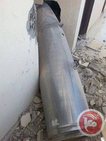
An Israeli airstrike targeted the Rafah crossing with Egypt on Wednesday, causing injuries and damages, the director of Gaza border crossings said.
Four Palestinians, two of them children, were injured when Israeli missiles hit the crossing's waiting room, Maher Abu Sabha told Ma'an.
Abu Sabha urged Palestinians not to travel to the Rafah crossing for their own safety.
Israeli warplanes also targeted Kerem Shalom crossing with Israel on Wednesday, he added.
An Israeli army spokeswoman said she was looking into the incidents.
Four Palestinians, two of them children, were injured when Israeli missiles hit the crossing's waiting room, Maher Abu Sabha told Ma'an.
Abu Sabha urged Palestinians not to travel to the Rafah crossing for their own safety.
Israeli warplanes also targeted Kerem Shalom crossing with Israel on Wednesday, he added.
An Israeli army spokeswoman said she was looking into the incidents.
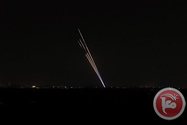
Four rockets fired from Gaza late Tuesday hit an illegal Israeli settlement west of Ramallah, causing a fire, witnesses told Ma'an.
Witnesses said a rocket landed in the settlement of Modiit Illit, and that Israeli ambulances and firetrucks rushed to the area.
They said they saw clouds of smoke rising from the settlement, and added that rocket warning sirens could be heard from several Israeli settlements in the Ramallah area.
An Israeli police spokesman did not answer calls seeking comment.
A temporary ceasefire between Israeli forces and Palestinian militants in Gaza collapsed hours before it was to expire on Tuesday when Israel said rockets from the Strip landed near Beersheba.
Israeli forces responded with airstrikes, and delegations from both sides left Cairo, where they had met for indirect negotiations to reach a long-term truce.
At least ten Palestinians have been killed by Israeli strikes in Gaza since the ceasefire collapsed.
The Israeli army said in a statement that over 80 rockets had been fired from the Strip in the same period. There were no reports of injuries.
It added that it had struck "60 terror sites" across Gaza in response to rocket fire.
During ceasefire talks, Palestinians have insisted that any long-term truce include the end of Israel's eight-year siege on the Gaza Strip, the release of dozens of prisoners rearrested by Israel after being released in 2011, the re-opening of a seaport and airport in Gaza, and the creation of a safe passage between the West Bank and the Gaza Strip.
Members of the Palestinian delegation had warned Tuesday that if Israel continued to "refuse" to make concessions, the ceasefire could collapse.
Witnesses said a rocket landed in the settlement of Modiit Illit, and that Israeli ambulances and firetrucks rushed to the area.
They said they saw clouds of smoke rising from the settlement, and added that rocket warning sirens could be heard from several Israeli settlements in the Ramallah area.
An Israeli police spokesman did not answer calls seeking comment.
A temporary ceasefire between Israeli forces and Palestinian militants in Gaza collapsed hours before it was to expire on Tuesday when Israel said rockets from the Strip landed near Beersheba.
Israeli forces responded with airstrikes, and delegations from both sides left Cairo, where they had met for indirect negotiations to reach a long-term truce.
At least ten Palestinians have been killed by Israeli strikes in Gaza since the ceasefire collapsed.
The Israeli army said in a statement that over 80 rockets had been fired from the Strip in the same period. There were no reports of injuries.
It added that it had struck "60 terror sites" across Gaza in response to rocket fire.
During ceasefire talks, Palestinians have insisted that any long-term truce include the end of Israel's eight-year siege on the Gaza Strip, the release of dozens of prisoners rearrested by Israel after being released in 2011, the re-opening of a seaport and airport in Gaza, and the creation of a safe passage between the West Bank and the Gaza Strip.
Members of the Palestinian delegation had warned Tuesday that if Israel continued to "refuse" to make concessions, the ceasefire could collapse.
Palestinian killed in Israeli strike on Gaza City
Health ministry spokesman Ashraf al-Qidra said an unidentified Palestinian was killed by Israeli strikes on western Gaza City on Wednesday.
The man's body was taken to al-Shifa hospital.
Health ministry spokesman Ashraf al-Qidra said an unidentified Palestinian was killed by Israeli strikes on western Gaza City on Wednesday.
The man's body was taken to al-Shifa hospital.
Palestinian succumbs to wounds sustained in Zaytoun strike
A Palestinian man succumbed to wounds sustained in an Israeli strike on the al-Zaytoun neighborhood of Gaza City on Wednesday, health ministry spokesman Ashraf al-Qidra said.
The man was identified as Sami Hasan Ayyad.
A Palestinian man succumbed to wounds sustained in an Israeli strike on the al-Zaytoun neighborhood of Gaza City on Wednesday, health ministry spokesman Ashraf al-Qidra said.
The man was identified as Sami Hasan Ayyad.
A two-year-old Palestinian girl was killed in Israeli shelling on the al-Zaytoun neighborhood of Gaza City Wednesday, health ministry spokesman Ashraf al-Qidra said in a statement.
Al-Qidra said Nour Muhammad Abu Hasirah was killed in shelling near Hassan al-Banna mosque in the neighborhood.
Al-Qidra said Nour Muhammad Abu Hasirah was killed in shelling near Hassan al-Banna mosque in the neighborhood.
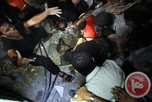
Palestinian rescues try to dig out an injured man blocked under rubble following an Israeli air strike on a house in Gaza City on Aug. 19, 2014
Israeli airstrikes killed the wife and child of Hamas' military chief in Gaza overnight, exiled leader Mousa Abu Marzouq said early Wednesday.
"The Israeli occupation took missiles fired from Gaza as a pretext to target a senior Hamas personality," Abu Marzouq wrote on Facebook, referring to Muhammad Deif, the commander of the al-Qassam Brigades.
"The wife of the great leader was martyred with his daughter," in a strike Tuesday night, he said.
An Israeli strike late Tuesday targeted the al-Dalou home in Sheikh Radwan, killing a woman and a young girl, medics said.
Ma'an reporters in Gaza said the attack killed two children, one of whom was Deif's son, and Deif's wife.
Meanwhile, seven Palestinians were killed in an Israeli airstrike on a home in Deir al-Balah, medics said.
The victims were identified as Raafat al-Louh, his brothers Muhammad and Ahmad, his pregnant wife Nabila, his sons Farah, Maysara, and Mustafa.
Medics were unable to save Nabila's fetus, though she had been nine months pregnant.
Eight others were injured in the attack and evacuated to al-Aqsa Martyrs' hospital in in Deir al-Balah.
A 24-hour truce due to last until midnight collapsed late Tuesday afternoon, with each side blaming the other.
The al-Qassam Brigades said in a statement that it fired 34 rockets into Israel throughout Tuesday, hitting Tel Aviv and the southern city of Beersheva.
An Israeli military statement put the number fired at "about 50" but reported no casualties.
"A rocket hit an open area in the Tel Aviv metropolitan area," it said and confirmed that two rockets landed near Beersheva, which is home to around 200,000 Israelis.
Air raid sirens were also heard in Jerusalem, with Hamas claiming a rocket attack on the city.
Police said it appeared that a rocket fell on empty ground in the occupied West Bank, outside Jerusalem.
Israeli Prime Minister Benjamin Netanyahu ordered a new round of air strikes on Gaza and recalled his negotiators from Egyptian-mediated ceasefire talks in Cairo.
"The rocket fire which broke the ceasefire also destroyed the foundation on which the talks in Cairo were based," Netanyahu spokesman Mark Regev told AFP early Wednesday.
"The Egyptian initiative is based on a total and unconditional cessation of hostilities, which was clearly broken when rockets were fired into Israel."
'Ceasefire has broken down'
Palestinian delegation head Azzam al-Ahmed said that his team would leave Cairo on Wednesday.
"We are leaving ... but we have not pulled out of negotiations," he told AFP, adding the Palestinians were waiting for Israel to respond to their truce proposal.
"We will not come back (to Cairo) until Israel responds," he said.
The fighting shattered nine days of relative quiet in the skies over Gaza.
A senior Hamas official, Ezzat al-Rishq, warned Israel it would "not enjoy security so long as the Palestinian people do not."
But Israel's US ally put the blame squarely on the group itself.
"Hamas has security responsibility for Gaza ... Rocket fire came from Gaza," State Department spokeswoman Marie Harf said.
"As of right now, with today's developments, we are very concerned and it is our understanding the ceasefire has broken down."
The renewal of Israeli air strikes spread panic among Gaza residents.
An AFP reporter saw hundreds of Palestinians streaming out of Shujaiyya, an eastern area of Gaza City which has been devastated by more than a month of fighting between Israel and Palestinian militants.
More poured out of the Zeitoun and Shaaf areas, alarmed by a series of explosions and heading to shelter in UN schools, local witnesses said.
Bomb shelters opened in Israel
In Israel the army said that it ordered that public bomb shelters within 80 kilometers (50 miles) of the Gaza border, be opened ready for use.
That includes Tel Aviv and Jerusalem.
Israel has vowed not to negotiate under rocket fire, and Netanyahu has pledged "a very strong response" to any resumption of rocket attacks.
The Cairo talks center on an Egyptian proposal that meets some Palestinian demands, such as easing Israel's eight-year blockade on Gaza, but puts off debate on other thorny issues until later.
Amnesty International renewed an appeal for access to Gaza.
"Valuable time has already been lost," it said.
Egypt's proposal calls for both sides to immediately stop shooting and includes provisions relating to opening the borders to allow for free movement of people, goods and construction materials, as well as a clause on regulating the economic crisis within the impoverished enclave.
But crucially, it postpones discussions on issues such as a port and airport for another month, until "after calm and stability returns," along with talks over exchanging the remains of two Israeli soldiers for the release of Palestinian prisoners.
Israeli airstrikes killed the wife and child of Hamas' military chief in Gaza overnight, exiled leader Mousa Abu Marzouq said early Wednesday.
"The Israeli occupation took missiles fired from Gaza as a pretext to target a senior Hamas personality," Abu Marzouq wrote on Facebook, referring to Muhammad Deif, the commander of the al-Qassam Brigades.
"The wife of the great leader was martyred with his daughter," in a strike Tuesday night, he said.
An Israeli strike late Tuesday targeted the al-Dalou home in Sheikh Radwan, killing a woman and a young girl, medics said.
Ma'an reporters in Gaza said the attack killed two children, one of whom was Deif's son, and Deif's wife.
Meanwhile, seven Palestinians were killed in an Israeli airstrike on a home in Deir al-Balah, medics said.
The victims were identified as Raafat al-Louh, his brothers Muhammad and Ahmad, his pregnant wife Nabila, his sons Farah, Maysara, and Mustafa.
Medics were unable to save Nabila's fetus, though she had been nine months pregnant.
Eight others were injured in the attack and evacuated to al-Aqsa Martyrs' hospital in in Deir al-Balah.
A 24-hour truce due to last until midnight collapsed late Tuesday afternoon, with each side blaming the other.
The al-Qassam Brigades said in a statement that it fired 34 rockets into Israel throughout Tuesday, hitting Tel Aviv and the southern city of Beersheva.
An Israeli military statement put the number fired at "about 50" but reported no casualties.
"A rocket hit an open area in the Tel Aviv metropolitan area," it said and confirmed that two rockets landed near Beersheva, which is home to around 200,000 Israelis.
Air raid sirens were also heard in Jerusalem, with Hamas claiming a rocket attack on the city.
Police said it appeared that a rocket fell on empty ground in the occupied West Bank, outside Jerusalem.
Israeli Prime Minister Benjamin Netanyahu ordered a new round of air strikes on Gaza and recalled his negotiators from Egyptian-mediated ceasefire talks in Cairo.
"The rocket fire which broke the ceasefire also destroyed the foundation on which the talks in Cairo were based," Netanyahu spokesman Mark Regev told AFP early Wednesday.
"The Egyptian initiative is based on a total and unconditional cessation of hostilities, which was clearly broken when rockets were fired into Israel."
'Ceasefire has broken down'
Palestinian delegation head Azzam al-Ahmed said that his team would leave Cairo on Wednesday.
"We are leaving ... but we have not pulled out of negotiations," he told AFP, adding the Palestinians were waiting for Israel to respond to their truce proposal.
"We will not come back (to Cairo) until Israel responds," he said.
The fighting shattered nine days of relative quiet in the skies over Gaza.
A senior Hamas official, Ezzat al-Rishq, warned Israel it would "not enjoy security so long as the Palestinian people do not."
But Israel's US ally put the blame squarely on the group itself.
"Hamas has security responsibility for Gaza ... Rocket fire came from Gaza," State Department spokeswoman Marie Harf said.
"As of right now, with today's developments, we are very concerned and it is our understanding the ceasefire has broken down."
The renewal of Israeli air strikes spread panic among Gaza residents.
An AFP reporter saw hundreds of Palestinians streaming out of Shujaiyya, an eastern area of Gaza City which has been devastated by more than a month of fighting between Israel and Palestinian militants.
More poured out of the Zeitoun and Shaaf areas, alarmed by a series of explosions and heading to shelter in UN schools, local witnesses said.
Bomb shelters opened in Israel
In Israel the army said that it ordered that public bomb shelters within 80 kilometers (50 miles) of the Gaza border, be opened ready for use.
That includes Tel Aviv and Jerusalem.
Israel has vowed not to negotiate under rocket fire, and Netanyahu has pledged "a very strong response" to any resumption of rocket attacks.
The Cairo talks center on an Egyptian proposal that meets some Palestinian demands, such as easing Israel's eight-year blockade on Gaza, but puts off debate on other thorny issues until later.
Amnesty International renewed an appeal for access to Gaza.
"Valuable time has already been lost," it said.
Egypt's proposal calls for both sides to immediately stop shooting and includes provisions relating to opening the borders to allow for free movement of people, goods and construction materials, as well as a clause on regulating the economic crisis within the impoverished enclave.
But crucially, it postpones discussions on issues such as a port and airport for another month, until "after calm and stability returns," along with talks over exchanging the remains of two Israeli soldiers for the release of Palestinian prisoners.
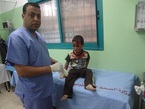
Child wounded in Gaza Wednesday
Sources in Gaza report that Israeli airstrikes that began at midnight Wednesday morning, with the ending of the temporary ceasefire, continued throughout the night until Wednesday morning.
The Wednesday morning airstrikes reportedly killed 7 in central Gaza City, mainly from the Allouh family. This is in addition to three civilians, including a small child, who were killed earlier the same night.
Some reports have claimed that one of the more than thirty airstrikes fired by Israeli forces in the early hour of Wednesday morning was meant to target Mohammed al-Deif, the current head of the armed wing of Hamas, and ended up killing his wife and child.
Sami Abu Zuhri, a spokesman for Hamas, said that the Israeli airstrikes were an attempt by the Israelis to “sabotage the negotiations in Cairo”. He also denied that Hamas fired any rockets toward Israel on Tuesday.
Azzam al-Ahmad, a Palestinian negotiator representing the Fateh party also blamed Hamas, saying "There was an Israeli decision to make the Cairo talks fail”.
Israeli officials had claimed that several rockets were fired from Gaza into Israel, causing no injuries or damage, on Tuesday before the end of the ceasefire. But Palestinians denied this claim, saying that it was Israel who broke the truce with a series of airstrikes that killed three people and wounded nearly 20.
The Israeli airstrikes hit Beit Lahia, al-Zaitoun, al-Maghazi camp, Dir al-Balah, Al-Qarara, Khuzaa, Tal al-Hawah, Rafah and eastern Sheja’eyya.
Independent journalist Mohammed Omer reported airstrikes in Jabalia just after dawn on Wednesday, as well as numerous airstrikes on Rafah and Khan Younis.
In Rafah, the Madi and Abdeen family homes were targeted, wounding at least ten.
As the Israeli airforce launched its renewed air raids on Gaza, the Israeli government recalled its envoy from the negotiations in Cairo.
Sources in Gaza report that Israeli airstrikes that began at midnight Wednesday morning, with the ending of the temporary ceasefire, continued throughout the night until Wednesday morning.
The Wednesday morning airstrikes reportedly killed 7 in central Gaza City, mainly from the Allouh family. This is in addition to three civilians, including a small child, who were killed earlier the same night.
Some reports have claimed that one of the more than thirty airstrikes fired by Israeli forces in the early hour of Wednesday morning was meant to target Mohammed al-Deif, the current head of the armed wing of Hamas, and ended up killing his wife and child.
Sami Abu Zuhri, a spokesman for Hamas, said that the Israeli airstrikes were an attempt by the Israelis to “sabotage the negotiations in Cairo”. He also denied that Hamas fired any rockets toward Israel on Tuesday.
Azzam al-Ahmad, a Palestinian negotiator representing the Fateh party also blamed Hamas, saying "There was an Israeli decision to make the Cairo talks fail”.
Israeli officials had claimed that several rockets were fired from Gaza into Israel, causing no injuries or damage, on Tuesday before the end of the ceasefire. But Palestinians denied this claim, saying that it was Israel who broke the truce with a series of airstrikes that killed three people and wounded nearly 20.
The Israeli airstrikes hit Beit Lahia, al-Zaitoun, al-Maghazi camp, Dir al-Balah, Al-Qarara, Khuzaa, Tal al-Hawah, Rafah and eastern Sheja’eyya.
Independent journalist Mohammed Omer reported airstrikes in Jabalia just after dawn on Wednesday, as well as numerous airstrikes on Rafah and Khan Younis.
In Rafah, the Madi and Abdeen family homes were targeted, wounding at least ten.
As the Israeli airforce launched its renewed air raids on Gaza, the Israeli government recalled its envoy from the negotiations in Cairo.
|
|
